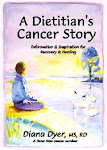Dr. Ravasco's long-term follow-up (median, 6.5 years) of 111 colorectal cancer patients in a prospective trial revealed that the shortest survival (4.1 years) and highest mortality rate (30%) occurred in patients who were not given any nutritional intervention. Patients who were given high-protein liquid supplements had a median survival of 6.5 years and a mortality rate of 22%, but the longest survival (7.3 years) and lowest mortality (8%) were observed in patients who received personalized nutritional advice.
Recognizing malnutrition, the need for nutritional supplementation, and encouraging the intake of commercially available nutritional supplements (such as Ensure or Boost as just two possible examples) is certainly better than no intervention at all, but this study clearly shows which group did best, and I want to be in the group with timely and individualized nutritional assessment and intervention by an oncology RD if I have another cancer diagnosis!!
Wow - I feel like saying "Do you know where your children are at midnight?", translating to "Does your cancer center have an RD, or two or three, to professionally assess the nutritional status of the high number of potentially malnourished cancer patients at your cancer center (even you!) and then to provide the individualized nutritional advice, interventions, and appropriate monitoring?"
If not, why not?, and what is your cancer center waiting for? I feel the answer to both of those questions should be the same (a resounding "Yes!"). If the answer is "No", then some strategy change for providing optimal (i.e. comprehensive) care is urgently needed.
Dr. Ravasco's long-term data also clearly show that in addition to improving overall survival, timely and individualized dietary counseling improved patients’ quality of life to a greater extent than did protein supplements or no nutritional intervention. Extending life is a worthy goal, but quality of life should have at least equal weight and equal attention. Extending life only to be miserable due to complications from the tumor type or complications related to the treatment(s) itself is an unfair and miserable choice for a person. If personalized nutritional intervention can improve both length of life and quality of life, what is not to want or provide here? What oncology professional would not want that double outcome benefit for himself?
Over my years of traveling around the country speaking at cancer centers which provided varying degrees of nutritional expertise included within their cancer care, I can tell you that there is no obvious and clear (i.e. mandated) path to including individualized, timely, and professional nutritional expertise by oncology RDs included as a "given" component of comprehensive cancer care.
I have seen cancer centers where a full-time art therapist was on board but NO nutritional support at all. I was asked to speak at another major cancer center that hired an RD for 8 hours per week to only see breast cancer patients who had referrals from their doctor plus also had insurance that would reimburse the center for the RDs professional fee. That last situation did not work at all because patients who did not meet those criteria got angry (good for them!) and started vociferously complaining to the cancer center administrator about how unfair this situation was (I'll say it again - good for them!).
In addition, there are cancer centers that have RDs on board who cannot possibly provide individualized and timely care that Dr. Ravasco's data show will provide benefits (i.e., work with a patient to prevent/minimize weight loss rather than only getting a referral after a 30# weight loss, which, sadly, happens all too often) because the staffing ratio of RD/patients treated at the cancer center is miniscual or astronomical, whichever way you want to configure that ratio.
So the answer, my advice? Speak up!, spread the word!, share these data! with everyone possible! at your cancer center! Somehow, some way, some cancer centers (see my previous post) are finding ways to provide nutritional care as a valued component of their comprehensive cancer care. I know that if you have found your way to my blog (either for the first time or regularly), I am likely "preaching to the choir". However, even with compelling data such as these two studies show, change will not come overnight and may not come at all unless there is a "nutrition champion" at your cancer center who is not going to let this gaping and neglected hole in the oncology care provided continue.
In your own way, I hope the information on my blog helps you take a step to "be the change you wish to see in the world (~M.Ghandi)", if not for yourself, then for all the millions of people who will be diagnosed with cancer this year and in years to come. I thank you from the bottom of my heart for your efforts to close this hole. :-)
"Cultivate your life - you are what you grow - inch by inch, row by row"
Diana Dyer, MS, RD


1 comment:
Diana Dyer,
My name is Ashlee Bartine and I am a student at Arizona State University. For a school project, I am writing an article for consumers about the effects of consuming soy products and breast cancer. I would love the opportunity to ask you a couple brief questions and use your responses in my article. If you can help me out, my email is abartine@asu.edu and I would greatly appreciate it :)
Thank you for your time,
Ashlee
Post a Comment